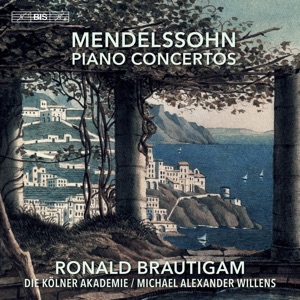There’s no need to spend much time on this release. One of the main premises behind the historically informed performance movement is that music of earlier periods sounds better on the instruments for which it was written. This is in itself debatable, but let’s leave that aside. Brautigam plays on a 2010 modern copy of an 1830 Pleyel piano. Does this instrument sound like the best of its era? Its brand? Does it even sound like the instrument being copied sounded when it was in its prime? We don’t know. We can’t know.
What we do know is that Brautigam’s instrument sounds lousy, period. The treble lacks sparkle. Rapid passagework (and there’s a lot here) tends to blur. Legatos aren’t fully sustained (check out the slow movements of both concertos). The instrument doesn’t “speak” quickly enough to cut through even Mendelssohn’s carefully balanced scoring, particularly at these tempos. Die Kölner Akademie on this outing does the accompaniments full justice–no problem with period instruments there, and the engineering is first class. Brautigam’s certainly got the chops to play this dashing, delightful music effectively. What he doesn’t have, though, is the piano.
































